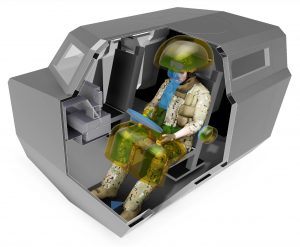
Military ground vehicle occupant workspaces are developed using guidance from MIL-STD-1472, the Department of Defense Design Criteria Standard: Human Engineering. Basic component dimensions and clearances given within the vehicle interior are meant to accommodate the central 90 percent of the target design population. The relation of these values to the body dimensions, postures, and clearance requirements of the occupant have been lost in many cases, so it is not possible to make allowances for changing user populations and levels of body borne gear. DEVCOM Ground Vehicle Systems Center, working in collaboration with the University of Michigan Transportation Research Institute (UMTRI), and DEVCOM Analysis Center (DAC), is developing graphical anthropometric design tools, referred to as accommodation models, that adjust automatically based on user inputs describing the target design population, desired accommodation level, and vehicle environment.
Ensuring that a given percentage of the population can sit safely and naturally in military ground vehicles while performing all required functions, including driving, requires multivariate analysis methods that consider the physical dimensions of the occupant (anthropometry) and behavioral effects (posture) in a three dimensional (3D) space. Empirical data of service members sitting in mockups of ground vehicle workstation environments, while wearing various clothing and equipment ensembles, was collected and analyzed by UMTRI to create the mathematical basis for the accommodation models. Because vehicle designs are developed from the early concept stages forward using Computer-Aided Design (CAD) software, this work was subsequently encoded by DEVCOM Ground Vehicle Systems Center into parametric CAD templates using PTC Creo®. Under the guidance of DAC, clearances between the occupant and surrounding interior surfaces and vision requirements have been layered onto the resulting 3D accommodation boundaries.
Software
- Fixed Heel Point (FHP): Driver CAD Accommodation Model, Version 1.0
- Fixed Eye Point (FEP): Driver CAD Accommodation Model
- Fixed Seat: Non-Driver CAD accommodation model
- Fixed Human Accommodation Reference Point (HARP): Commander CAD Accommodation model
- Highly Reclined Seat (HRS) CAD Accommodation Model
Technical Reports
- Creation of the Driver Fixed Heel Point (FHP) CAD Accommodation Model for Military Ground Vehicle Design, Conference Paper, TR-28004
- Fixed Eye Point CAD Accommodation Model Verification Plan 16Dec2020v1.0 OPSEC4890
- Fixed Eye Point CAD Accommodation Model Verification Report 7Jul2021v1.0 OPSEC5587
- Fixed HARP: Commander CAD Accommodation Model Verification Report OPSEC7901
- Fixed HARP: Commander CAD Accommodation Model Verification Plan 31Aug2022v1.0, OPSEC6856
- Fixed Heel Point (FHP) Accommodation Model Verification & Validation (V&V) Plan – Rev A, Technical Report No. 2882
- Fixed Heel Point (FHP): Driver CAD Accommodation Model Verification Report, Technical Report No. 29840
- Fixed Seat: Non-Driver CAD Accommodation Model Verification Report – Version 1.0, OPSEC3871
- Fixed Seat: Non-Driver CAD Accommodation Model Verification Plan – Revision 1.1, OPSEC2069
- Highly Reclined Seat CAD Accommodation Model Verification Plan 28April2022v1.0 OPSEC6457
- Highly Reclined Seat (HRS) CAD Accommodation Model Verification Report 29Apr2025v1.0 OPSEC9709
Contact Us
For questions related to the CAD accommodation models or reports, please e-mail: usarmy.detroit.rdecom-tardec.mbx.accommodation-model-team@mail.mil
Scientific Basis for the Model
Through the Automotive Research Center, a U.S. Army Center of Excellence for Modeling and Simulation of Ground Vehicles, the University of Michigan conducted studies to develop statistical population accommodation models for Soldier accommodation in vehicles. This research is the basis for the suite of Computer-Aided Design (CAD) accommodation models being developed by the DEVCOM Ground Vehicle Systems Center Advanced Concepts Team (ACT). U of M documented the research in the reports listed below:
The Seated Soldier Study: Posture and Body Shape in Vehicle Seats, UMTRI-2013-13
Development of Accommodation Models for Soldiers in Vehicles:Driver, UMTRI-2014-26
Development of Accommodation Models for Soldiers in Vehicles: Squad, UMTRI-2014-39
Development of Driver Posture Prediction and Accommodation Models for Military Vehicles: Fixed-Eye-Point, Out-of-Hatch, and Highly Reclined Driver Configurations
